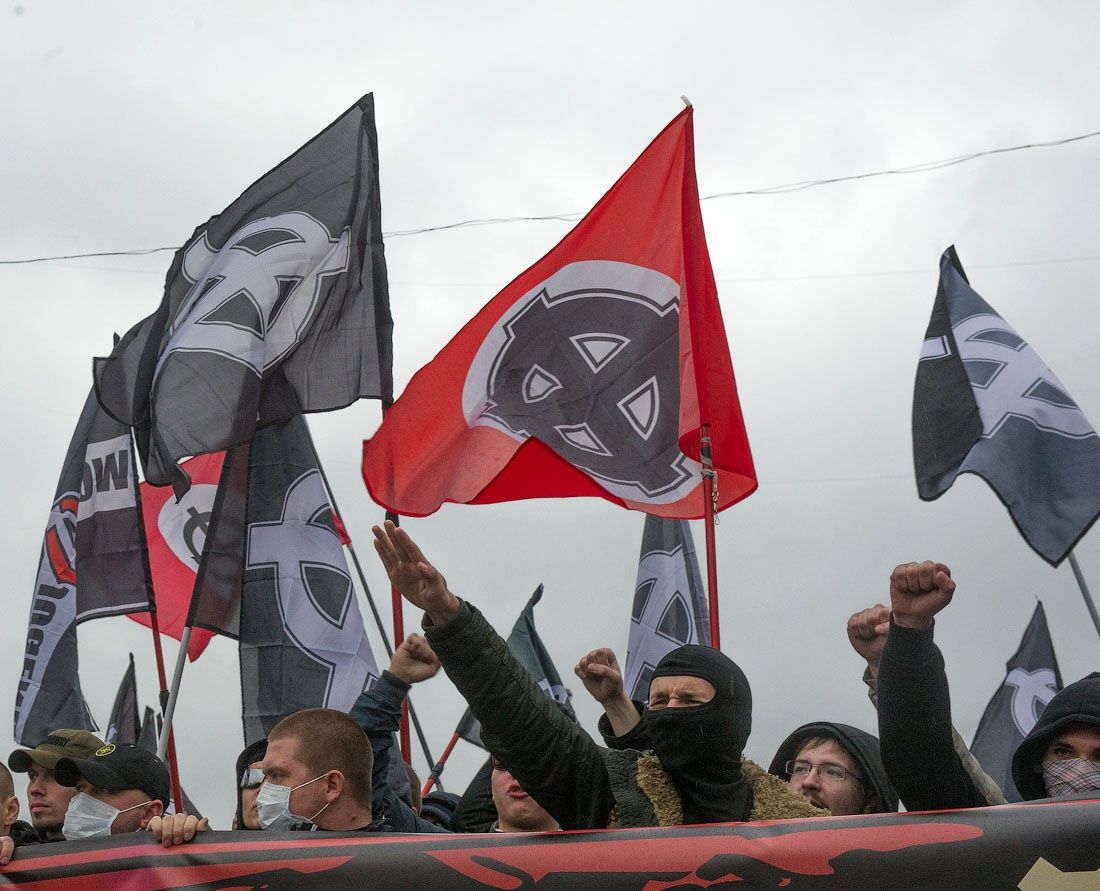Incitement of Hatred
 "Russian march" in the Moscow district of Lublino.
"Russian march" in the Moscow district of Lublino.
In Russia, we can observe a fairly massive number calls for inter-ethnic and religious strife in the Russian information space, although it is obvious that in late 2014 - early 2015, there has been a reduction in this trend. Significant role in this is played by the Russian-language Internet, where it is not uncommon to meet calls for xenophobic violence.
Most popular extreme right websites are “Right News”, “Right News Agency”, “Russian Information Agency”, “Russian Observer”, “Russian Platform”, “Russian Imperial Movement”, “National Resistance”, “Velesova Sloboda”, “RAC Forum”, rusnat.org, as well as “Sputnik and Pogrom” and Livejournal blogging site. Several examples of such publications in 2015 are given below:
On February 12, 2015, it was reported that member of the St. Petersburg Jewish Centre, Leokadia Frenkel, is being bullied on the social networks. She was accused of helping “children of migrant criminals, who commit 70% of crime in Russia and 80% of rape in St. Petersburg”.
On February 20, 2015, it was reported that the screening of a movie called “Holocaust – Wallpaper Glue?” sparked a wave of hatred towards Jews in Kostroma. Some members of a popular online forum proposed to “arrange a Holocaust” on the forum, as the “carrier of world Zionism” and expressed dissatisfaction that “not all of them were burnt”.
On March 6, host of “State of Affairs” programme on Radio Echo of Moscow, Sergey Parkhomenko, received a text, saying: “When will you, Jew-face, finally be shot?”
Some calls of such nature have been noted in popular media outlets and public figures. This concerns anti-immigrant, anti-LGBT, anti-Islam and anti-Semitic sentiments.
For example, on May 1, member of St. Petersburg Legislative Assembly, V. Milonov, tried to disrupt an LGBT march and threatened to “eliminate all homo-organisations”.
Orthodox activists who attacked an unsanctioned LGBT rally in Moscow on May 30 were holding a banner, reading: “No to Euro-gay values! No to Euro-gay development! Only Russia! Only victory!”
Several cases of Russophobic graffiti have been reported in spring-summer 2015. Most cases occurred in Tatarstan. In March, graffiti saying “Down with the Moscow-Cheka junta”, “Death to occupiers”, “Freedom to the Tatar nation,” were found in a subway station in Kazan. In April, graffiti saying “Russians go home” was found in the Tatar capital. On June 8, Russophobic graffiti and calls to violence were found in Volohva.
Xenophobic literature is regularly published in Russia (most of all – anti-Semitic•). There are several publishers who make these books part of their business plan. The largest of these is “Algorithm” publishing house, followed by “Russian Truth”, “Institute of Russian Civilisation” (mainly engaged in reprinting early 20th century works), “Book World” and “Mitrakov”. The latter is specialised in publishing anti-Semitic works of the self-proclaimed “academic” Levashov.
The most comprehensive set of xenophobic literature could be found at book fairs in the All-Russian Exhibition Centre in March and September, where all five aforementioned publishers were present. This literature is also sold in respectable bookstores.
For example, on January 5, it was reported that a book by R. Klyuchnikov called “Destalinisation – from Churchill to Medvedev” is being sold in St. Petersburg Book House under the section “Lectures in People’s University”. The book was dedicated to identifying the revolutionary movement and the Soviet regime with the Jewish government, which Stalin supposedly fought against. The book also repeated the usual anti-Semitic theories about the Jewish government in Russia since 1991.
Russia has a number of extreme right musical bands. Most popular among them is a band called “Kolovrat”. Their concerts are usually semi-underground. The only exception is the “Russian March” in Moscow.
Multi-ethnic clashes against the background of migrant-phobia occurred in Yakutsk in March 2019. The reason was the rape of a local resident by a visitor from Kyrgyzstan. About three thousand people came to a meeting on March 18 at the Triumph sports complex with representatives of the authorities. The Mayor Sardana Avksentieva promised to intensify the fight against illegal migration. The head of the republic also promised to identify and deport the illegal migrants and, if necessary, to take new restrictive and prohibitive measures. There were reports in the media about threats to migrants from local residents, pogroms of stalls. It became known that at least five Kyrgyz were beaten on the streets of Yakutsk.
Another egregious example of the prevalence and entrenchment of migrant-phobia in society was the appointment in 2019 of an employee of a Magnit chain store in Shchelkovo, near Moscow, who was on trial for a xenophobic attack on a visitor from Tajikistan, as director of a neighboring Magnit. An expression of Islamophobia are the protests against the construction of mosques In 2018-2020 they were noted in Yekaterinburg and Perm. In the latter, protesters were convinced that the appearance of a mosque would lead to an increase in the number of migrants in the area. The persistence of anti-Semitism in the mass consciousness is evidenced by its public manifestations, which receive media coverage.
On December 3, 2018, it became known that Bryansk lawyer Sergei Maslov appealed to the local Department of Internal Affairs with a demand to initiate a criminal case in connection with the installation of a menorah in the city's Partizan Square. In his opinion, the appearance of a religious symbol in a public space contradicts the law, since the square is not intended for religious rites. A year later, in December 2019, Maslov and Alexander Kupriyanov, former secretary of the Bryansk regional committee of the CPRF, appealed to the FSB department, the prosecutor's office and the city authorities with a statement demanding that the December celebration of the Jewish Hanukkah holiday in Partizan Square not be allowed, stating that the celebrations allegedly "generate anti-Semitic sentiment in society" and that the organization holding them, and Hesed Tikva "is actually a foreign agent, acting in the region for only one nationality".


